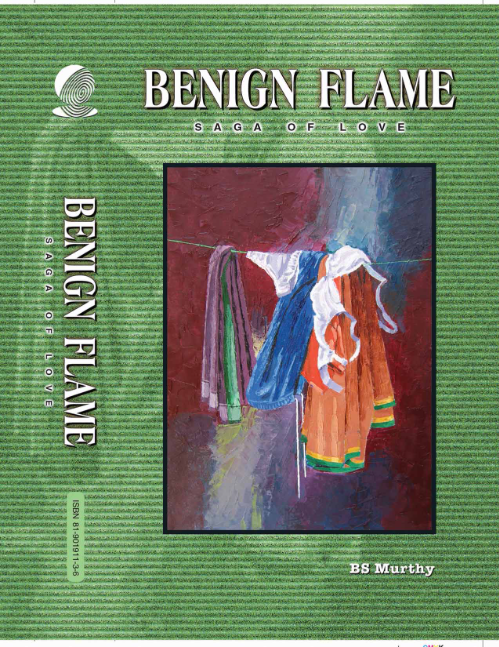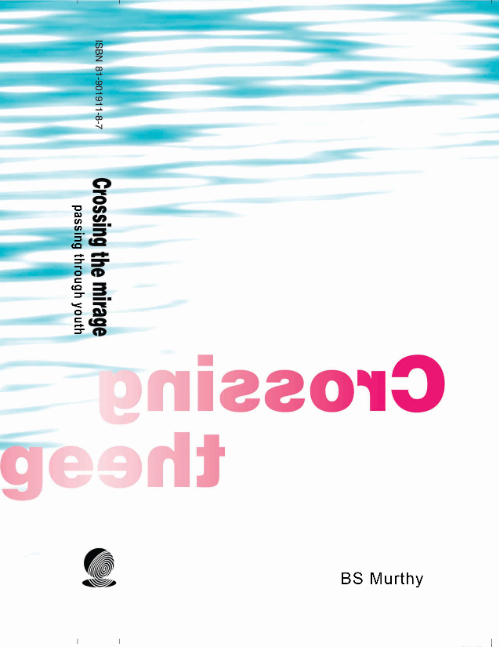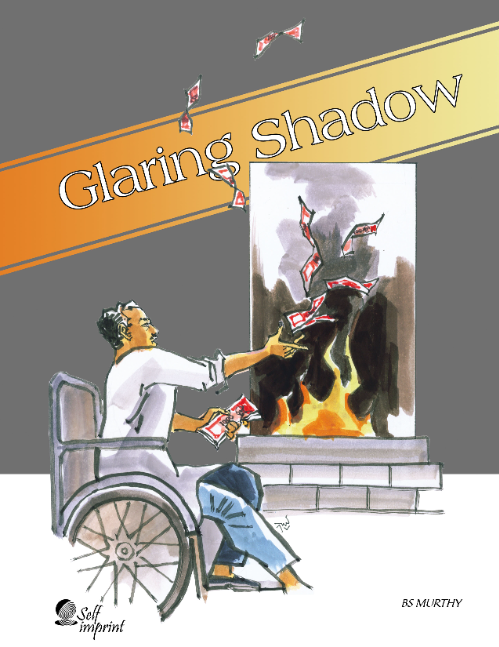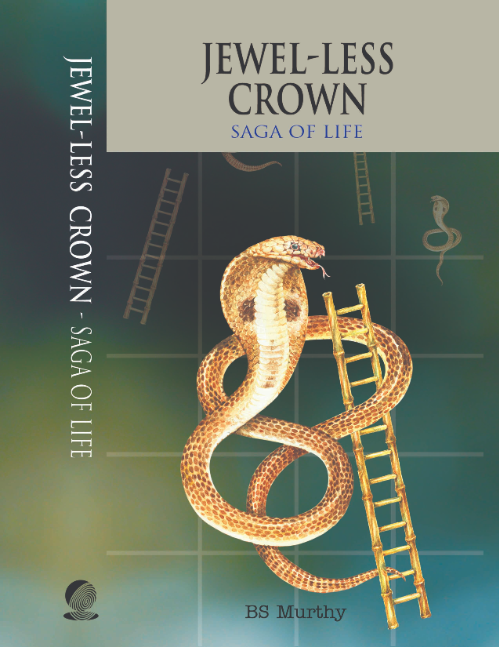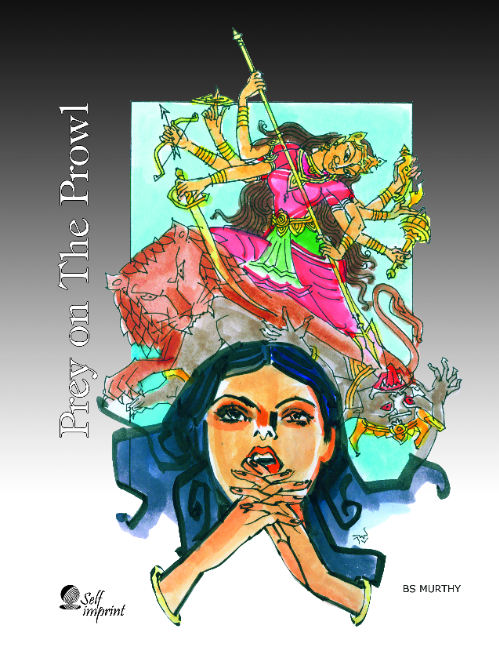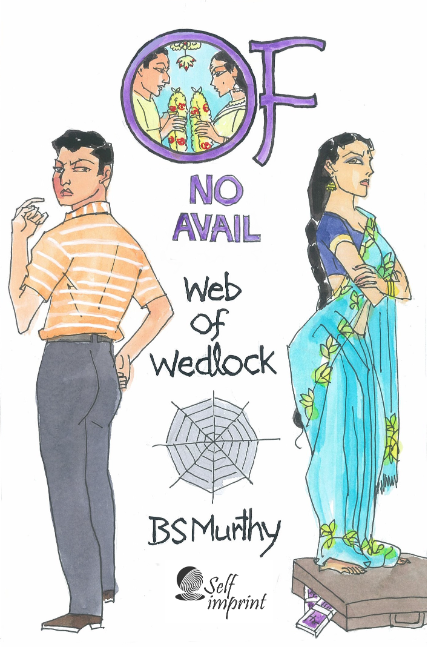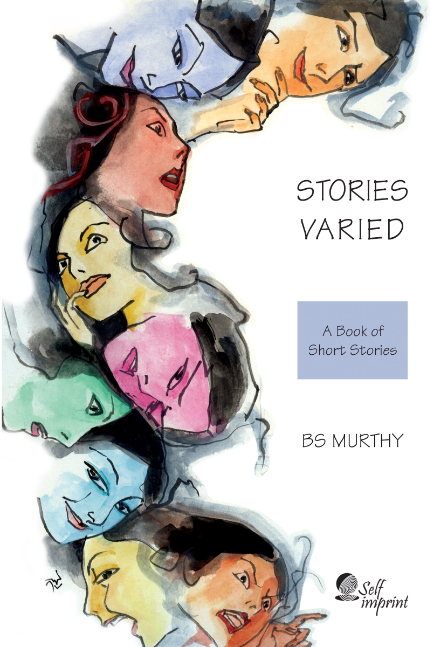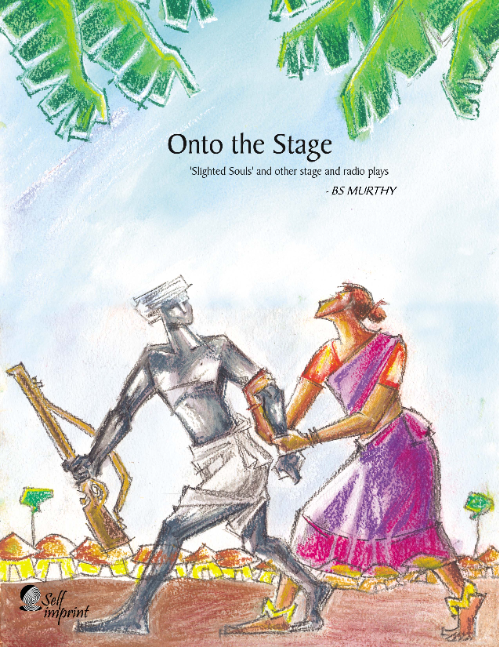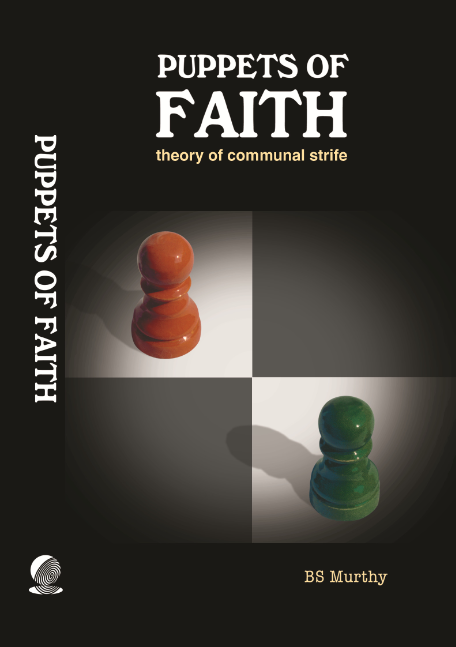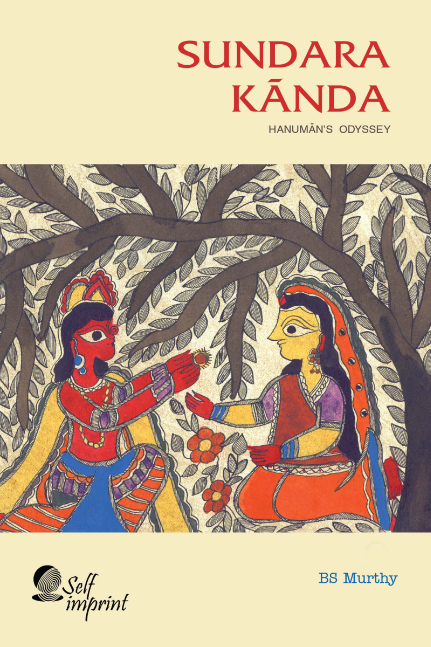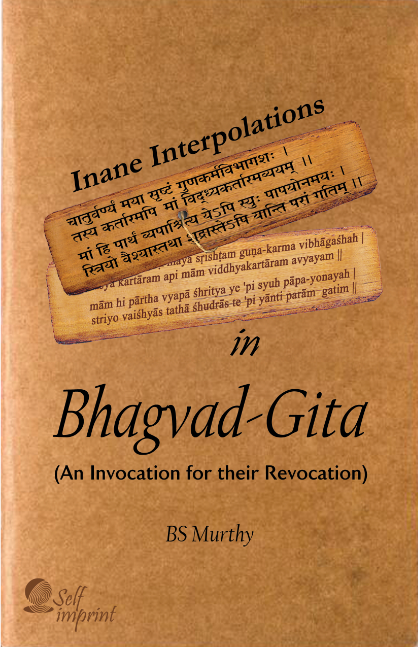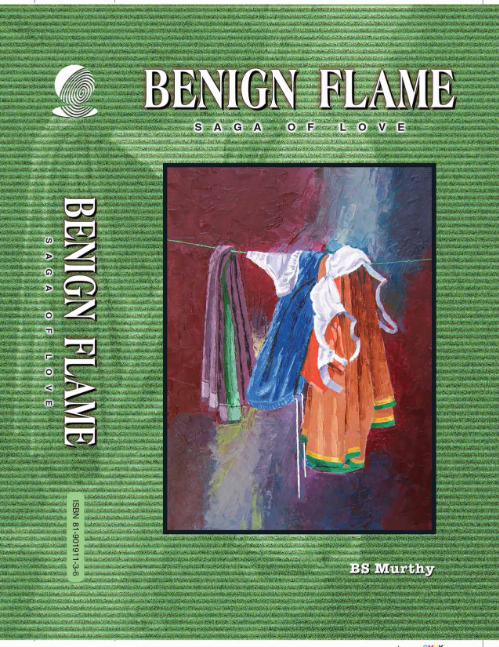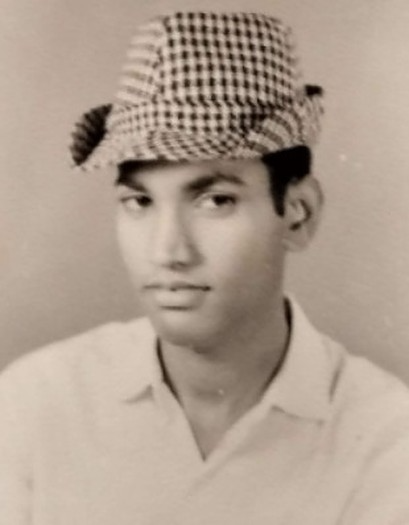
BS Murthy
- Home
- Author
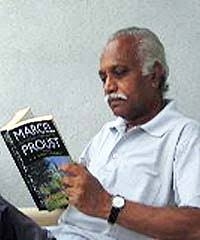
-
Description
-
Articles (15)
I’m an Indian novelist, playwright, short story, non-fiction 'n articles writer, translator, a 'little' thinker and a budding philosopher in ‘Addendum to Evolution: Origins of the World by Eastern Speculative Philosophy’ that was originally published in The Examined Life On-Line Philosophy Journal, Vol. 05 Issue 18, Summer style="margin-left:0in;text-align:justify;">Born on 27 Aug 1948 and having been schooled in letter-writing, in my mid thirties, I happened to articulate my managerial ideas in thirty-odd published articles, and later penned Benign Flame: Saga of Love, Jewel-less Crown: Saga of Life, Crossing the Mirage: Passing through youth (plot and character driven novels), Glaring Shadow: A stream of consciousness novel, Prey on the Prowl: A Crime Novel, Of No Avail: Web of Wedlock, a novella, Stories Varied: A Book of Short Stories and Onto the Stage: Slighted Souls and other stage and radio style="margin-left:0in;text-align:justify;">Besides Puppets of Faith: Theory of Communal Strife (A Critical Appraisal of Islamic Faith, Indian Polity ‘n More), a ‘novel’ narrative, possibly in a new genre, and the critique Inane Interpolations in Bhagvad-Gita (An Invocation for their Revocation) in the arena of non-fiction, my literary endeavours in the translation zone had been the versification of the Sanskrit epics, Vyasa’s Bhagvad-Gita as Treatise of self-help and Valmiki’s Sundara Kãnda as Hanuman’s Odyssey in contemporary English idiom,
Later, as a prodigal son, I took to my mother tongue, Telugu, to craft the short story తప్పటడుగులు (Missteps)
Whereas my fiction had emanated from my conviction that for it to impact readers, it should be the soulful rendering of characters rooted in their native soil but not the hotchpotch of local and alien caricatures sketched on a hybrid canvas, all my body of work was borne out of my passion for writing, matched only by my love for style="margin-left:0in;text-align:justify;">MY body of work as above is in the public domain as free ebooks that can be style="margin-left:0in;text-align:justify;">Moreover, some of my articles on management issues, general insurance topics, literary matters, and political affairs published in The Hindu, The Economic Times, The Financial Times, Triveni , arereproduced in
I, a graduate mechanical engineer from Birla Institute of Technology, Mesra, Ranchi, India, had been a Hyderabad-based Insurance Surveyor and Loss Assessor from 1986 -
Benign Flame: Saga of Love
The attractions Roopa experienced and the fantasies she entertained as a teen shaped a male imagery that ensconced her subconscious. Insensibly, confident carriage came to be associated with the image of maleness in her mind-set. Her acute consciousness of masculinity only increased her vulnerability to it, making her womanliness crave for the maleness for its gratification.
However, as her father was constrained to help her in becoming a doctor, she opts to marry, hoping that Sathyam might serve her cause though the persona she envisioned as masculine, she found lacking in him. But as he fails to go with her idea, she becomes apathetic towards him, and insensibly sinks into her friend Sandhya’s embrace, for lesbian solace.
Soon, in a dramatic sequence of events, Tara, a suave call girl, tries to rope Roopa into her calling; Roopa herself loses her heart to Sandhya's beau Raja Rao, and Prasad, her husband’s friend falls for her. And as Prasad begins to induce Sathyam to be seduced by whores to worm his way into her affections, Roopa finds herself in a dilemma. However, as fate puts Raja Rao into Roopa’s arms in such a way as to lend novelty to fiction, this ‘novel’ nuances man-woman chemistry on one hand, and portrays woman-woman empathy on the other.
Who said the novel is dead; 'Benign Flame' raises the bar as vouched by -
The plot is quite effective and it’s a refreshing surprise to discover that the story will not trace a fall into disaster for Roopa, given that many writers might have habitually followed that course with a wife who strays into extramarital affairs - Spencer Critchley, Literary Critic, U.S.A.
The author has convinced the readers that love is something far beyond the marriage tie and the fulfillment in love can be attained without marriage bondage. The author has achieved a minor revolution without any paraphernalia of revolution in the fourth part of the novel – The Quest, India.
The author makes free use of – not interior monologue as such, but – interior dialogue of the character with the self, almost resembling the dramatic monologue of Browning. Roopa, Sandhya, Raja Rao and Prasad to a considerable extent and Tara and Sathyam to a limited degree indulge in rationalization, trying to analyse their drives and impulses – The Journal of Indian Writing in English.
Overall, Benign Flame is a unique attempt at exploring adult relationships and sexuality in the contemporary middle-class. All the characters come alive with their cravings and failings, their love and their lust. Benign Flame blurs the lines and emphasizes that life is not all black and white - it encompasses the full spectrum of living - Indian Book Chronicle.
This free ebook, in multiple formats, is in the public domain in umpteen ebook sites.
Chapter 1, Ramaiah’s Family
That winter night in the mid-seventies, the Janata Express was racing rhythmically on its tracks towards the coast of Andhra Pradesh. As its headlight pierced the darkness of the fertile plains, the driver honked the horn as though to awake the sleepy environs to the spectacle of the speeding train. On that, in the S-3, were the Ramaiahs with their nine year-old daughter Roopa.
Earlier, from Ramavaram, it was in the nick of time that Ramaiah took Janaki to Vellore for the doctors to extricate her from the jaws of death. Now, having been to Tirupati for thanksgiving, he was returning home with his wife and Roopa they took along for the sojourn. While her parents were fast asleep, Roopa sat still on a side berth, reminiscing her times at the hospital where Janaki took one month to recuperate under Dr. Yasoda’s care.
Soon the train stopped at a village station, as though to disrupt Roopa’s daydreams of modeling herself on the lady doctor at the Christian Medical College Hospital, and as she peeped out, the ill-lit platform seemed to suggest that the chances of her being Dr. Roopa could be but dim. Ramaiah too woke up to the commotion caused by the incoming passengers, and was surprised to see his daughter still awake, lost in her thoughts.
“What are you scheming my darling?” he said in jest.
“Naanna, won’t you make me a doctor?” she said as though in a trance.
“Haven’t the nurses already made you a junior doctor?” he said affectionately, bringing her escapades at the hospital back into her mental focus, and pleased with her idea, he patted her to sleep, even as he recalled his anxieties associated with her birth.
Ramaiah was jolted from his reverie as someone in the compartment switched on the light, to prepare himself to alight at the coming station.
‘Surely she would shape up into a dusky beauty. Won’t she be bright as well?’ he thought, looking at Roopa in her deep sleep, and recalled her escapade when she was hardly three.
“You know how clever our Roopa is?” said Janaki, at bedtime. “She wanted the timepiece to fiddle with and when I refused to give in, she cried no end. When she forgot what she was crying for, she cried to know why she cried at all! What a unique girl our Roopa is!”
As the train moved into a major junction, Ramaiah got down, looking for a coffee vendor. Unable to find even a tea vendor, he lit his Berkeley without a beverage. When the guard whistled the start, a half-naked urchin jostled past Ramaiah into the bogie to crouch in the vestibule. While the train was on the move, Ramaiah wondered whether the urchin had crouched to draw warmth from his heart to ward off the chillness, and pitying him, as he gave him some money the lad took as a matter of right.
‘Isn’t there something called gratitude?’ thought Ramaiah, feeling disregarded. ‘Is he so naive that he knows not civility? Or could he be an outcast, unfamiliar with the niceties of society?’ Ramaiah looked at him intently as though for a clue.
‘Is it possible that his exposure to the elements in his nakedness should’ve robbed his body of its sense of feeling?’ he thought, finding the wretched lad as cool as a cucumber. ‘Now, what he needs most is a piece of cloth to cover him with. After all, money wouldn’t provide warmth by itself, would it?’
Ramaiah went to his trunk to fetch a vest for the urchin. Seeing him wear it without even looking at him, Ramaiah wondered whether the lad was indifferent to the world in general.
‘Could life get worse than that?’ Ramaiah wondered, as he tried to go back to sleep on his allotted berth. How was he to know that one day, despairing for love, Roopa would personify the wretched side of life itself.......
Crossing the Mirage - Passing through Youth
If passing through youth was like crossing the mirage of life for Chandra and Nithya, it proved to be chasing the mirage of love for Sathya and Prema though for plain Vasavi, Chandra's pitiable sibling, it was the end of the road.
As life brings Chandra, who suffers from an inferiority complex for his perceived ugliness, and Nithya, who was bogged down being jilted by Vasu, together, they script their fate of fulfillment.
And as poetic justice would have it, Sathya, who caused Prema's heartburn, himself was led down the garden path by Kala, doing a Sathya on Sathya.
Just not that, life has in store just deserts for Vasu owing to Nithya's retribution as he tries to stalk her.
Besides, after many a fictional twist and turn, the way the coming of age novel ends, challenges the perception that fact is stranger than fiction.
This free ebook, in multiple formats, is in the public domain in umpteen ebook sites.
Chapter 1, Shackles on Psyche
Youth is the mirror that tends us to the reality of our looks. The reflections of our visages that insensibly get implanted in our subconscious lend shape to our psyche to define the course of our life.
This is the saga of Chandra’s chequered life that mirrors this phenomenon in myriad ways.
As perceived by the deprived, he had a fortunate birth. Yadagiri, his father, was the prominent pearl merchant in Hyderabad - Deccan, the seat of the Nizam’s power in undivided India. The patronage of the royals and the nobles alike, helped add gloss to his pearls making him the nawab of the trade. Besides, Princely Pearls, his outlet near the Charminar, was a draw with the rich, out to humor their wives and adorn the mistresses.
When Anasuya, Yadagir's wife, was expecting her second issue, trouble brewed in Telangana, the heart of the Nizam’s province. While his subjects' surge to free themselves from his yoke clashed with the Nizam’s urge to keep his gaddi, Sardar Patel's plans for a pan India was at odds with his designs to retain the Deccan belt as his princely pelf.
‘With a go by to the nobility,’ Yadagiri tried to envision his future, ‘it could be shutters down at the Princely Pearls.’
Thus, at the prospect of the momentous merger, even as the populace got excited, he was unnerved perceiving a slowdown in his trade. Confounding him further, as the impending merger was on the cards, Anasuya's delivery time neared
‘Should it be a girl again,’ he thought, ‘it would be only worse. Why, without a boy, what of the surname?’
Soon, as his wife was moved to the hospital, he was rattled by the prospect of her delivering another daughter. But, as it turned out, his fears proved to be liars on both counts.....
Glaring Shadow - A stream of consciousness novel
In a stream of consciousness mode, Glaring Shadow is the self-account of the life and times of a man, who liquidates his immense wealth only to consign it to the flames.
The agony and ecstasy of his life as he makes it big in our materialistic world and the way he loses his soul in the bargain, only to regain it when tragedy strikes him makes one ponder over the meaning of success in life.
This philosophical ‘novel of a memoir’ is a compelling read that is conducive to contemplate about the nature and scope of human relationships.
This free ebook, in multiple formats, is in the public domain in umpteen ebook sites.
Chapter 1, Glaring Shadow
He had the soul of our times, and is the namesake of many. He tamed success by the scruff of its neck, only to fuel envy in our neighborhood. When it seemed there was no stopping him, fate dealt him a deadly blow in his early sixties. Besides losing his wife, son and daughter-in-law with their children in that fatal road mishap, he found his leg mangled in the debris of that Ferrari. The intensity of the pity all felt for him seemed to match the magnitude of his loss, but as he became a recluse, his thought eluded all, and in due course, his tragedy became a thing of the past. But, in time, his intriguing behavior brought him back to the top of the page three in the local media – why he had disposed off his lucrative real estate for a song that left the realtors in the lurch. And as if to create a newsflash in the business world, he had off- loaded his considerable stockholding, which sent the bulls running for cover in the country’s bourses. Soon, even as the scrip was still crunching in the bear hug, the closure of his umpteen bank accounts earned him the national headlines, as it heralded a first rate liquidity crisis in the country’s banking system. But even in that gloomy setting, it cost me a fortune to acquire his palatial bungalow the outhouse of which he had retained.
When I called on him for chitchat that morning, I was shocked to see him shredding mounds of money lying beside him. Unmindful of my protests, as he picked up another wad of notes, I snatched it from him as if it were the money I paid through my nose. However, getting hold of another set, when he resumed his destructive regimen, I said it was absurd that the toil of a lifetime should be laid waste thus. Maybe, to clear my vision as well as to set his mind at rest, he unwound himself, which I would rewind for man to readjust his clock of life. But then why not reveal his name when he is worth writing about? It’s because, the value of this tale lies not in his name, hallowed though, but in the hollowness of life he had led that is even as his name became a synonym for fame. However, if someone were to guess who it is, so be it.
“My tragedy brought to the fore the falsities of life,” he began melancholically...
Jewel-less Crown: Saga of Life
It's perilous penning this blurb.
It's fine when man is modest about his work.
It even affords him the aura of an invisible crown!
But what about his work?
Were it an art or craft, it is there for all to see.
What of a literary work of an unheralded author?
Well, lauding the same might raise one's eyebrows.
Failing to praise wouldn't make a 'jewel-less crown' either!
Why not see, if this is the great Indian novel.
This is the story of the rise and fall of an ambitious man, the decline, and the decay of his conniving wife, the trials, and tribulations of their wayward son as well as the grit and gall of a spirited woman, who enters into his life.
This depiction of their life and times not only pictures the facets of ambition and achievement, intrigue and betrayal, compulsion and compromise, sleaze and scandal, trial and sentence, but also portrays the possibilities of repentance and resolution, love and empathy coupled with compassion and contribution, leading to the spirituality of materialism, and that makes it the saga of our times.
The story of a lifetime, truly.
This free ebook, in multiple formats, is in the public domain in umpteen ebook sites.
Book One : Artha ‘n Kama: Chapter 1 - Party Gone Sour
That New Year's Eve, all the nouveau riche of New Delhi seemed to have gathered at the Misty Nest in their ubiquitous wear. While women wore designer dresses, men turned up in safari suits. Hosting them at their grand dwelling in the Defense Colony were the Gautams, Prabhu and Sneha. By the time the last guest was hugged in welcome, Gautam’s silk kurta and Sneha’s mink coat were truly crumpled. Augmenting the warmth of their bonhomie was the Glenfiddich with soda. In time, while the lure of the Scotch drove many into the lap of Bacchus, the allure of Venus enticed others to ogle at the desirable. But, above all, it was Gautam’s good-humored banter and Sneha’s sensuous charm that lent aura to that midnight rendezvous.
When the New Year was an hour away in its coming, what with the inebriated becoming tardy in their tangos, the going got really bawdy. As Sneha too got into the act, there was a virtual riot for a round with her. When someone went overboard to bottom pinch her, she paid back with a belly punch that regaled the gathering.
As the gigantic clock was all set to halve the night, the antique chandeliers were put off. When the radium hands went straight up on the dial, the ribaldry reached a new low on the floor. At that, as the Gautams goaded all to raise their hands to fold out the year on hand, the boozers struggled to get on to their feet to welcome the year in the offing. But, for its part, the antique piece welcomed the incoming year with the first of its twelve chimes that reverberated in that sprawling banquet hall.
In the prevailing darkness, the euphoria that followed led to a fresh round of bear-hugs amongst the sexes before the stewards switched on the chandeliers as though to let those bear witness to the goings on. As if that translucence showed the revelers the reality of life, sanity was restored in that exuberant setting, and soon the pangs of hunger made the gathering scamper for the buffet of varied cuisines, brought from the capital’s five-star restaurants....
Prey on the Prowl - A Crime Novel
Even as Detective Dhruva was enamored of Kavya, whom he rescues from her kidnapper, Radha, an alleged murderess on the run, gatecrashes into his life.
But when Kavya too joins him after her man was poisoned there ensues the tussle of a love triangle, which gets unraveled in a poignant end, but not before a series of murders.
So, then who could have poisoned Ranjit the realtor, Shakeel the Inspector, Pravar the criminal and Natya his accomplice?
Well the needle of suspicion tilted towards Pravar that was till he perished with his mate, but then who was the one?
Could it be Radha under the scanner for her role in the death of her husband Madhu and his mistress Mala, Pravar's sister?
Or was it Ranjit's spouse Kavya, who owing to Stockholm Syndrome, takes to Pravar her kidnapper.
As these deaths by poisoning puzzle Dhruva, Radha avers that Kavya had the motive and the means to kill her spouse, her paramour and his wife besides the cop.
However, reckoning that when the ill-motives of the natural suspects to commit a murder are an open secret, someone with a hidden agenda might be tempted to use that as a camouflage for his subterfuge, Dhruva begins to look around for the culprit.
This free ebook, in multiple formats, is in the public domain in umpteen ebook sites.
Chapter 1, Prey on the Prowl
That June evening, the crimson sun gave in to the dark monsoon clouds to let them end its long summer reign over the Deccan skies. What with the thickening clouds thundering in triumph, Detective Dhruva woke up from his siesta, and by the time he moved into the portico of his palatial bungalow at 9, Castle Hills, the skies had opened up to shower its sprawling lawns. It was as if the eagerness of the rainfall matched the longing of the parched soil to receive its fertile mate in an aroma of embrace, and in the ensuing echoes of that seasonal union, the roots of the garden plants devoured every raindrop, that is, even as their leaves shed the overburden to accommodate the new arrivals.
In that setting, as Dhruva, impelled by all that, stood engrossed, Raju, the housekeeper, fetched him a plateful of hot pakodas, which, facing the spatter, he began to savor, and before he had finished with the snack, Raju returned with a mug of steaming Darjeeling tea for him. Soon, as the refreshed sun resurged to warm up the leaves, even as the satiated roots let the bounty go down the drain; done with the beverage, the detective picked up the sachet of lanka pogaku to roll a cigar, and then as he reached for the cigar lighter, the rainbow, in its resplendent colors, unfolded in the misty skies. However, when he began puffing away at the exotic cigar, as if dispelled by its strong scent, the dissipated clouds began disappearing from the horizon.
Having savored the cigar to the last puff, as he stubbed the butt and stepped out onto the lush green wet lawn, Dicey, the Alsatian, followed him, as if to leave its own footprints on the damp canvas in its master’s tracks. Then, even as the rainy clouds began regrouping in the skies, he covered the garden to caress every croton and coleus as he would his pet. But when it portended downpour, Raju led Dicey into the portico and the detective headed towards the study to pick up the half-read Crimes Digest of the month....
Of No Avail: Web of Wedlock
Lured by the pitch - All marriages are made in heaven but some are delayed on earth: We endeavor to hasten them all - Priya goes to Renuka Marriage Bureau.
Scanning the prospects, when she spotted Venu, whom she slighted long ago, she rushes to him to bring about a dramatic encounter.
What brought about Priya’s change of heart to seek her former suitor and how Venu responds to his old flame’s fresh overtures lend suspense to their romance in this novella.
This free ebook, in multiple formats, is in the public domain in umpteen ebook sites.
Chapter 1 – Surprises of Life
ALL MARRIAGES ARE MADE IN HEAVEN BUT SOME ARE DELAYED ON EARTH:
WE ENDEAVOUR TO HASTEN THEM ALL.
So read the billing at Renuka Marriage Bureau. Rushing to Venu, Priya reread the same.
‘Oh, how fortuitous!’ she thought excitedly as she walked up to her car. ‘So, I could wed him now. Going by his photograph, he looks handsomer than ever; if anything, that streak of grey hair only lends him an aura of its own! It’s as well that he doesn’t dye his hair as most dandies would, more so while seeking a bride. Isn’t it true to his character; being truthful to himself, and to others as well. So, he’s divorced, which means that he was married; what was his wife like; could he have wed on the rebound? How long would’ve their marriage lasted; what could’ve gone wrong with their wedlock? By the way, have the roughs and toughs of his marital life affected his amiable disposition? May not have been, given the softness of his visage in that picture; oh, how I was tempted to flick it from that folder! But why did my sense of decency tie my hands when fate itself played foul with me; didn’t it make me reject his hand out of hand?’
Having reached her car, and sitting still at the steering, she continued to take the clock back in time, ‘How I used to like him in those days, but fate made me blind to his marital charms. But now he’s nearing forty-four and I’m touching thirty-nine; so what, as age has seemingly spared us both its ravages of time to afford us a hectic time to make up for our lost time. Maybe that’s why he looks at his handsomest best and my allure too is at its peak; wont’ all those ogling eyes tell that? Now that his picture has brought my loss to the fore, nearly two decades after our parting of ways, is it that fate has come to repent its thoughtless act? But is it going to redress its wrong doing? If so, when he sees me now, won’t it induce romantic impulses in him replacing his bitter memories of our parting? And for all that, ours could be one such marriage made in heaven that got delayed on earth. Maybe his divorce portends that. But still, given his past hurt and my present proclivities, would he like to own me? Well, I would know that soon enough, won’t I? But come what may, I won’t lose him this time for I can’t bear his loss anymore.’ ..
Stories Varied – A Book of Short Stories
This is a collection of the author’s short stories that deals with women's dilemmas in the Indian social milieu accompanied with unique denouements.
While 'Ilaa's Ire' contrasts woman's lot of the day with her eminence in the Vedic Age, '201' Qualms" depicts her predicament, torn between personal loyalty and citizen's responsibility.
As "?" addresses woman's marital stress in an alien land, 'Cupid's Clue' is about her acting on rebound in her native place.
Even as 'Autumn Love' lets woman discover the marital void in her life, 'A Touchy Affair' makes her amenable to her man's other woman.
Just as 'Love's How's That' inflames woman's old flame, 'A Hearty Turn' brings her innate lesbian leanings to the fore.
If 'Love Jihad' bridges lovers' religious divide with a secular plank, 'Tenth Nook' creates her marital gulf on the materialistic ground.
While 'Eleventh Hour' is about woman's lust for love, 'Twelfth Tale' underscores her zest for power.
This free ebook, in multiple formats, is in the public domain in umpteen ebook sites.
Foreword
With the addition of ‘Prey on the Prowl’ to my body of work, I thought the accretion was over without short story genre. Not that I didn’t try my hand at that, indeed I did, but finding the output wanting, I didn’t refill my pen again.
Maybe, literature was keen to have my contribution in this fictional sphere as well, so it seems, as beginning from July 2015, Vinita Dawra Nagia came up with “Write India Campaign of Times of India”. Her idea was to let the aspiring writers build their stories on the ‘prompts’ provided by eleven of India’s popular authors starting with Amish Tripathi.
When I penned Ilaa’s Ire on Amish’s prompt, it felt like I had crossed the unassailable frontier, and thereafter, for the next ten months, thanks to the prompts by Chetan Bhagat, Aswin Sanghi, Ravi Subramanian, Preeti Shenoy, Tuhin A. Sinha, Ravinder Singh, Durjoy Datta, Madhuri Banarjee, Jaisree Misra and Anita Nair, I had experienced the joy of short story writing.
That in the end, I could pen my Twelfth Tale, sans any prompting, perhaps, is a testimony to the success of Vinita’s Write India Campaign.
Story 1, Ilaa’s Ire
‘I am sick of this!’ she grunted loudly, dangling her weary legs in the languid waters.
'Why not,' she thought, 'am I not a victim of the unmaking of the mores of yore that brought woman's life to this pass?'
Gazing at the Sun, setting by then, she felt it symbolized the loss of sheen, of woman’s high noon of life, pictured by her grandmother in bedtime tales.
‘If only things remained the same,’ she began to speculate about her would-have- been life, ‘I would have gone to a gurukula to become a satyavadini at fifteen, and who knows, I might have blossomed into a Maitreyi of the day, if not a modern day Ghosa. Moreover, I would have been entitled to choose a man I fancied in a swayamvara, oh, what an appetizing prospect it is. Won’t that prove our ancestors were wise enough to realize that woman’s liberation lay in her right over her body to entrust it to the man she coveted? But how ignoramus the progeny of the wise have become to ordain woman to remain illiterate and live in ignorance! How she’s given away in marriage, to a man of her father’s choosing, lo, when she hasn’t even matured! What else is woman nowadays if not man’s vassal? How sad that women of Sauviragram, or Paithan for that matter, can’t dare dream about things, which their ancestors took for granted. Maybe, same is the case with fair sex everywhere in the once fair land named after my namesake.’
As though to bring to the fore her dreams gone sour, the flow under her feet picked up stream. ...
‘
Onto the Stage – Slighted Souls and other stage and radio plays
This is a compendium of the author’s Indian stage and radio plays:
"Slighted Souls" is a poignant love story set in rural Telangana, beset with feudal exploitation of the downtrodden dalits. Besides forcing the dalits to toil in the fields as bonded labor without impunity, the land owning doras had no qualms in reducing the womenfolk of this ilk as sex slaves in the gadis, which leads to an armed resistance engulfing an young couple.
Men at work on Women at work" is a tragic-comic episode depicting the fallout of sexual harassment at the workplace in the Indian urban setting with its traditional cultural underpinnings.
"Castle of Despair", built on the slippery ground of man's innate urge for one-upmanship, portrays its facade of falsity on the grand stage of human tragedy.
The radio play, "A Love on Hold", lends voice to the felt anxieties of a man and a woman as their old flame gets rekindled and the dilemmas of possession faced by the couple in a conservative cultural background.
This free ebook, in multiple formats, is in the public domain in umpteen ebook sites.
Stage play 1, Slighted Souls
Scene – 1
Voice Over: Under the British Raj in India, the self-indulging Nizams of Hyderabad abdicated the administration of their vast principality to doralu, the village heads, letting them turn the areas under their domain into their personal fiefdoms. While the successive Nizams were obsessed with building palaces and acquiring jewelry, the village heads succeeded in ushering in an oppressive era of tyrannical order. Acting as loose cannon from their palatial houses called gadis, the doralu succeeded in foisting an inimical feudal order upon the downtrodden dalits. Besides making these dalits toil for them as cheap labor without impunity, the doralu had no qualms in making vassals out of the hapless women folk. What with the police patels and the revenue patwaris in nexus with the landed gentry and the moneyed shaukars making a common cause with the doralu in their unabated exploitation, their sub-human condition ensured that the dalits were distressed economically, degraded socially and debased morally. Ironically, lending the privileged few the muscle power to perpetrate the inimical social order were their henchmen from the other backward classes. Moreover, given the British political pragmatism of an indifference to the Indian caste conundrum the downtrodden dalits had nowhere to run for cover.
Though the merger of their province with the Union of India brought the curtains down on the Nizams’ two-hundred year misrule, the exploitation of the rural dalits by the dora-patel- patwari nexus continued unabated. And that led to the formation of 'communes' as part of a peasant movement in July 1948 under the Telangana Struggle that didn’t take off any way. On the other hand as the seeds of egalitarianism began to take roots in the urban Indian soil, in time, these “slighted souls” too began to envision the dawn of an equitable era for them. However, the nascent upward mobility of the downtrodden was at odds with the vested interests of the feudal order, and to nip the dalit moral assertiveness in the bud, the ‘axis of evil’ saw to it that such were brutalized to make an example of them.
“Slighted Souls” scripts the life of the downtrodden of Rampur nearly a decade after the famous but failed peasant struggle of Telangana. Making cohorts with Muthyal Rao the dora in oppressing its dalits are Papa Rao the Police Patel, Rami Reddy the Patwari, Papi Reddy the landlord, and Shaukar Suryam the moneylender. Beginning with the life and times of Yellaiah and his wife Mallamma this play unfolds the urge of the deprived to unyoke themselves, and the desperation of the privileged to rein in them.
[Curtains up: Mallamma sits in front of her thatched hut in the dalit mohalla weaving a bamboo basket.
Enter: Yellaiah, and seeing him, she goes into the hut to fetch some water for him, and he takes over the work.]
Mallamma [Back with a glass of water]: Why make a mess of it maava.
Yellaiah [Taking over the glass]: Take it I’m giving them their due.
Mallamma: I wonder how they’re harming you.
Yellaiah [Having empted the glass]: Aren’t they harsh on my darling’s delicate hands?
Mallamma [Taking back the glass]: I’m glad you’re still fond of your old woman.
Yellaiah: Who said you’re old dear. I’m ever scared that some dora or a patel might grab my Malli.
Mallamma [Taking the bamboo work]: You know it would never be the case.
Yellaiah: Well but still.
Mallamma: Leave alone the patels and the patwaris, would the dora ever forget that incident in a hurry? Besides, I’m behind the bamboo curtain, am I not? ...
Puppets of Faith: Theory of Communal Strife (A Critical Appraisal of Islamic Faith, Indian Polity ‘N More)
The sublimity of Muhammad's preaching in Mecca and the severity of his sermons in Medina make Islam a Janus-faced faith that forever bedevils the mind of the Musalmans.
This thought-provoking work, besides dissecting the anatomy of Islam, steeped in the Quran, seeks to depict the psyche of the Musalmans, shaped by the proclivities of their prophet, vicissitudes of his life and the attitudes of his detractors, which the mechanism of their umma perpetuates.
More to the point, aided by “I’m Ok – You’re Ok”, the path-breaking work of Thomas A. Harris and Roland E Miller’s “Muslim Friends–Their Faith and Feeling”, this book, for the first time ever, psycho-analyzes the imperatives of the Muslim upbringing, which has the potential to turn a faithful and a renegade alike into a fidayeen.
Also, apart from delving into the ironies of the faiths that affected the fate of the peoples, eclipsed the cultures of communes, altered the course of history and afflict the politics of the day, this book examines how the sanãtana 'Hindu' dharma came to survive in India, in spite of the combined onslaught of Islam and the Christianity on Hinduism for over a millennium.
This book is for those who wish to be aware of the follies of their faith and the foibles of others to lighten the burden of dogma and reduce the baggage of prejudice postulated in its thirty-four well-structured chapters.
Also, besides providing a panoramic view of the Indian history, this thought-provoking book appraises the way its political leaders made or unmade the post-colonial India.
Possibly in a new genre, this free ebook is a book for our times, which in multiple formats, is in the public domain in umpteen ebook sites.
The lava of the volcano on which the world sits is the disaffection the Musalmans nurse towards the kafirs. While its chemistry world over is the Islamic religious rigidity, in India it is compounded by the Hindu ‘historical’ hurt, aggravated by the Muslim-appeasing political ethos of the State. It’s thus the Indian landscape is dotted with many of its earlier eruptions, but the one, in the wake of Godhra’s ‘burning train’ in 2002, affected everyone as never before. That a fanatical band of Musalmans should dare torch their Ram Sevaks in a railway coach of that Sabarmati Express seemed to the Sangh Parivar like Saladin crossing the Lakshman Rekha. And that the dalits too joined the hysterical Hindu mobs to burn their persons and property was beyond belief to the ghettoed Musalmans nevermind that many among the rioters were felled by police bullets.
In that setting, the prospect of a new-found Hindu unity spoiling their electoral party was something galling to the pseudo-secular politicians, who have been icing their caste-divisive Hindu electoral cake with the cream of the consolidated Muslim votes. The self-serving fourth estate that meanwhile expanded its ‘mass’ base, courtesy the idiot box, saw in all this a godsend ‘breaking news’, enabling the Islamapologic columnists (Islamapologia is about condescending to descend to the Musalmans) as well as Islam-naïve Hindu intellectuals to score a Brownie point or two into the Indian pseudo-secular goal. Not the ones to miss any opportunity for Hindu bashing, the ideologically afflicted left-liberals, as well as the half-read Hindu columnists, who ever shy as ever to stare at the Islamic fundamentalism straight in its face, had joined the anti-Hindutva bandwagon albeit by pushing the ghastly Godhra manifestation of Islamism under the secular carpet. Above all, the politicians of all ‘secular’ hues, alive as they are to every opportunity that presents itself to consolidate their Islamist constituencies, wouldn’t let this pass; so, they were in no hurry to leave the scene, but continued to stoke the communal fires to keep the electorate warm.
But yet to sustain the public interest for the sake of its profitability, even as the media needed to name a villain and focus its spotlight on him, Sonia the Italian, who had long usurped the grand old party of India, invented the one for it in Narendra Damodardas Modi, the Chief Minister of the riot-torn Gujarat and dubbed him maut ka saudāgar (merchant of death) unfairly though. It’s another matter however, that the media-maligned Modi, after many trials and tribulations, was anointed by Indians as their mukhiya (head), after a Hindu pushkara (12 years), to become the harbinger of the much need change, overdue by a long shot that is. History is naughty for it first creates chaos and then brings about order.
But the problem with a problem is that until one admits that it exists, one cannot address it, and unless it is addressed, it persists. Make no mistake here is this Musalmans disaffection for kafirs for the world to contend with, and the Hindu-Muslim discord is but its Indian variation. The pseudo-secular sophistry has it that when it comes to the basic tenets, all religions carry a premium on peace and all the believers seek social harmony but for a few misguided fanatical elements on either side of the communal divide.
However, sadly though, the ground reality is that to the average Hindu, it seems as if the Musalmans suffer from the symptoms of Islamic fever caused by a diseased mind-set afflicted by the sharia fervor. The Muslim compliment to the Hindu is the contemptuous kafir, destined for hell and all that goes with it. Indeed, it is but owing to the glossing over of these entrenched misgivings by the pseudo-secular politicians, who cater to the Islamic whims of obscurantist mullahs and moulvis as a means of appeasing the umma, that the communal lava erupts periodically to hurt the tenuous Hindu-Muslim coexistence in India, ironically partitioned, based on the Islamic premise that the umma cannot coexist with the Hindus.
This book seeks to outline the background of the Musalman-kafir animosity on one hand, and the Hindu–Muslim communal divide on the other. It would seem that these are the products of one or more of the scriptural notions, religious dogmas, medieval history, and modern politics, or all put together. As one cannot understand man unless he understands his religion, all must be abreast of the basic religious tenets of the competing or conflicting faiths, more so the sectarian Semitic dispensations. Then, it would be revealing how the religious scriptures per se contribute to social discord and communal disaffection, and /or both. In the strife-torn world of ours, it’s our grasp of this canvas of conflict that might eventually enable us to paint the picture of peaceful coexistence of the faithful of mutually contradicting belief systems.
Thus, the social evolution as well as the spiritual ethos of Hinduism and Buddhism on one hand and that of the Judaism, Christianity, and Islam on the other are sketched here in its rudiments. Also, since man carries the historical deadwood, in spite of himself, the history that connects and disconnects the Abrahamic faiths, and that which divides the Hindu-Muslim emotions is pictured for one to appreciate the background of their unceasing strife.
After all, there is more to religion than that meets the eye, which is the overriding faith and feeling of the believers in its divine inerrancy. Given that the Islamic creed is more so a product of Muhammad’s persona, the influence of his character in shaping the ethos of the umma has been analyzed. Won’t the Musalmans themselves concede that their endeavor would be to follow the straight path of Islam as earnestly as they could, as others, any way, have strayed onto the satanic path? Since it is this mind-set that makes the Musalmans apart in the religious sense, how this could possibly govern the Muslim psyche is scanned with “I’m Ok – You’re Ok” the famous work of Thomas A. Harris, with their religious creed from Roland E Miller’s “Muslim Friends–Their Faith and Feeling” as the probe.
All this might not only enable the ‘the others’ to appreciate the Muslim constraints but also understand their own aberrations. Likewise, it could be hoped that the Musalmans too would ponder over the apprehensions of the ‘the others’ as well as their own afflictions that are behind the Musalman-kafir confrontation.
Sundara Kānda: Hanuman's Odyssey
Whereas Mahabharata's Bhagvad-Gita is taken as a philosophical guide, Ramayana's Sundara Kãnda is sought for spiritual solace; many believe that reading it or hearing it recited would remove all hurdles and usher in good tidings! Miracles apart, it's in the nature of this great epic to inculcate fortitude and generate hope in man for it’s a depiction of how Hanuman goes about his errand against all odds.
Besides, it portrays how Seetha, on the verge of self-immolation, overcomes despair to see life in a new light? With rhythm of its verse and the flow of the narrative this sloka to sloka transcreation of the canto beautiful of Valmiki's adi kavya - the foremost poetical composition in the world, Hanuman's Odyssey that paves the way for Rama to rescue his kidnapped wife is bound to charm the readers and listeners alike.
Interestingly, as the following verse illustrates, this epic was the forerunner of the magic realism of our times – “Gripped she then him by shadow / Cast which Hanuman coast to coast, Recalled he in dismay then / What Sugreev said at outset / That one fiend had aptitude / To grip its prey by mere shadow.”
On a personal note, my paternal grandfather, Bulusu Thimmaiah-garu, like many in his time, was a life-long practitioner of Sundara Kãnda parayana (the epic’s daily recital in part or full), whose spirituality could have providentially guided me in this, rather an effortless, trans-creative endeavour.
This free ebook, in multiple formats, is in the public domain in umpteen ebook sites.
Canto 1, Hurdles in Skies
Egged on by peers Vayu’s son
Enshrined by man as Hanuman
Enthused himself to shoulder
Search of Seetha, Rama’s spouse
Snared whom Ravan to Lanka
Sea across that hundred leagues.
With his head then held so high
Gained he size for task on hand.
On that Mahendra mountain then
Colossus like he sauntered there.
Uprooted were trees all those
Brushed as with his chest that strong.
Varied hues of elements there
Made that mountain resplendent.
Grace angels those hill ranges
For their honeymoon so near moon.
At length he reached that hilltop
Lay where elephants in their scores.
Besides Brahma ’n Surya
Prayed he Indra and Vayu.
Facing east he sought blessings
Of Vayu then his Wind God dad
And grew more by turning south.
Grew as Hanuman more and more
To cross that sea vast as it roared
With full tides of full-moon night
Came he face to face with clouds.
As though to test that mountain
Whether it’s right for his take-off
Tapped it Hanuman with his feet.
Shook that mountain his impinge
Shed trees flowers of hues varied.
Flowers all fell then covered it full
Spread they fragrance far and wide.
Welled out water in thick springs
Such was pressure of Hanuman’s feel.
From the cracks it developed thus
Creaked out molten metals varied.
While huge boulders slid in scores
Out came smoke in thick columns.
With that squeeze it came under
Cried all creatures in their caves.
Frightened was no less wildlife
Heard were their howls world over.
In their state of confusion
Serpents with all fiery fangs
Marks of swastik on their hoods
Spewed then venom in profusion.
Venom they spit was fireball like
Turned to tiny stones there rocks.
Herbs of anti-venom were there
Turned though antidote none of them.
Felt all yogis spirit at play
Took to their heels demigods then. .......
Bhagvad-Gita: Treatise of Self-help
Bhagavad-Gita is the most beautiful, perhaps the only true philosophical song existing in any known tongue’ – William von Humboldt.
In this the beauty of the Sanskrit slokas is reflected in the rhythmic flow of the English verse of poetic proportions even as the attendant philosophy of the Gita is captured in contemporary idiom for easy comprehension.
Though it is a matter of consensus that Bhagvad-Gita in the present length of seven hundred slokas has many an interpolation to it, but no meaningful attempt has ever been made to delve into the nature and extent, not to speak of the effect of these on the Hindu society at large.
The moot point that has missed the attention of all, all along, is that if the Sudras were to be so lowly in the Lord’s creation, how come then the Gita’s architect Krishna, His avatar, and Vyāsa, its chronicler, happen to be from the same lowly Hindu caste fold. Moreover, is it not absurd to suggest that either or both of them had deprecated the station of their own varna (caste) on their own in their very own Gita?
The methodical codification of interpolations carried out here puts the true character of the Gita in proper perspective. Identified here are hundred and ten slokas of deviant nature and or of partisan character, the source of so much misunderstanding about this book extraordinary, in certain sections of the Hindu fold.
In the long run, exposing and expunging these mischievous insertions is bound to bring in new readers from these quarters to this over two millennia old classic besides altering the misconceptions of the existing adherents.
This free ebook, in multiple formats, is in the public domain in umpteen ebook sites.
Introduction
The spiritual ethos and the philosophical outlook that the Bhagavad-Gita postulates paves the way for the liberation of man, who, as Rousseau said, ‘being born free, is everywhere in chains’. But equally it is a mirror of human psychology, which enablesman to discern his debilities for appropriate redressal.
All the same, the boon of an oral tradition that kept it alive for over two millennia became its bane with the proliferation of interpolations therein. Besides muddying its pristine philosophy, these insertions affect the sequential conformity and structural economy of the grand discourse. What is worse, to the chagrin of the majority of the Hindus, some of these legitimize the inimical caste system while upholding the priestly perks and prejudices.
This rendition seeks to restore to the Gita, its original character by ridding it of hundred and ten interpolations, which tend to keep the skeptics away from it. And ironically these muddle the understanding of the adherents as well. In the theatre ofmanasnothingsurpassesthedramaofwar,thestageforunveilingtheGita’s unrivalled philosophy was set onthe battleground of Kurukshetraat the threshold ofthe battle of Mahabharata.
Chapter 1, Arjuna's Dilemma
In this opening chapter of Bhagvad- Gita, the grand stage for the discourse nonpareil is set on the battlefield of Kurukshetra. Gathered with their armies are the estranged cousins, the Pãndavãs and the Kauravãs, all set to join the battle.
1
Thus spoke Dhrutarãshtra:
Appraise Sanjay as my sons
Gathered at the battleground
Face the sons of my sibling
Eager for the war on hand.
2
Thus spoke Sanjaya:
Eyeing Pãndavs there lined up
So to assess relative strengths
Reached Duryodhan, Dron in time.
3
Find ãchãrya, said the Prince,
Pãndav force thus there arrayed
None other than by Drushtadyumn
Whom thou taught all tricks of war.
4
Virat ’n Drupad, so Yuyudhãna
With Bhim ’n Arjun they stand out.
5
Dhrushtaket, the one to dread
King of Kashi and Purujit
Kuntibhoj ’n Saibyã too
Chekitãn, their force augment.
6
Uttamouj ’n Yudhãmanyu
Abhimanyu so Vikrãnta
Draupadi’s offspring not to speak
Five-star generals all no less.
7
For thy feel of our own strength
Roll-call heroes of ours O, revered.
8
Thou with Bhishm, Karn ’n Kripa
Make all four our Field Marshals,
Bhurisrav, Aswathãm ’n Vikarn
Our Marshals, near Field Marshals.
9
With their lives on line for me
Adept at weaponry varied all
Abound valorous in our ranks
Past masters of group warfare.
10
Nurses Bhishmã force our vast
Lot it’s Bhimã’s tend their small.
11
Let’s close ranks in well laid files
Cover we flanks for Bhishmã’s guard.
12
Words by these moved
Grandsire Bhishm,
Warrior verily unrivalled
War cry he gave with his conch.
13
Egged by Bhishmã, geared Kauravs
War cries their rent, those high skies.
14
Krishna ’n Arjun, in their turn
From chariot of white stallions
Gave in kind they with kindred.
15
With Panchajanya, Lord Krishna
Broke sound barriers with Arjun
Who blew to hilt Devadatta
As blared Bhima, his Paundra.
16
Blew conch Yudhisthir full throated
Anantavijaya in tandem
With his siblings, Nakul ’n Sahadev,
Blew who Sughosh ’n Manipushpak.
17
King of Kashi, master archer
Sikhandi Marshal, their formidable
Sãthyaki, Drushtadyumn ’n Virãt
Warriors they all never vanquished,...
Inane Interpolations in Bhagvad-Gita (An Invocation for their Revocation)
The Manusmriti, the social doctrine of yore, and the Bhagvad-Gita, the spiritual tome in vogue that lay down the discriminatory dharma (duties) of the four social classes (castes) have been the bugbears of the Hindu backward classes. However, to their chagrin, of late, as the latter is being mindlessly promoted even though the former was constitutionally debunked, they began advocating that it too should be dumped in a dustbin.
Ironically, the improbability of their progenitor Krishna, the architect of the Gita, relegating his own ilk to the social margins failed to dawn upon these that Gita supposedly slights, even to this day! Thus, their intellectuals, instead of seeking to reclaim their priceless heritage, albeit after ridding its interpolative garbage, tend to rubbish it a la throwing the baby with the bathwater, and needless to say they must ponder.
Also, it is high time that the Gita-class stop laying store by the self-aggrandizing verses in this Vyāsa’s classic, evidently inserted by their progenitors that came to bedevil the Hindu spiritual integrity and social harmony. Likewise, the grumblers of the dalit desertions must see the need for setting the Hindu house in order to prevent the fractious poaching by the Church, if not to facilitate the ‘hoped for’ return of the prodigals. So also those who take pride that Hinduism is the only religion that reckons all faith as true, should be concerned about the ‘in vogue’ Gita that belittles some of their caste fellows. Besides, this work beckons the feminists to reckon the second of the two interpolations from it cited in the cover image that degrades them in unspeakable terms.
This ‘overdue’ work, may lead the ‘denied’ Hindu castes as well as the favored folks for an objective approach to the in vogue Bhagvad-Gita which could dispel the misgivings of the former and the delusions of the latter, thereby bridging the Hindu emotional gulf with its abridged book that restores its original form. Whether or not one concurs with its propositions, this original work could be of interest to the students of logic and reasoning as well.
This free ebook, in multiple formats, is in the public domain in umpteen ebook sites.
Author's Note
When it comes to my tryst with Bhagvad-Gita, I may say that one thing led to the other, but with a difference – I can share the details with the public in this invocation for the revocation of its inane interpolations from it.
When I was around twelve, my paternal grandfather encouraged me to read the Gita even as he discouraged my mother from venturing into it, voicing the then prevailing view that if women were to imbibe its philosophy, then that could undermine their emotive self in the family fold. Given the lower levels of child awareness in those village days, comparatively speaking that is, as I could neither share Arjuna’s concerns nor grasp Krishna’s response, my first brush with the Gita ended before the end of its second chapter.
However, over two score years later, as it happened, it was a human tragedy that occasioned my fortuitous reengagement with the Gita, eventually that was, as, in the wake of the 2002 Godhra-Gujarat riots, the Op-eds in the print and the debates in the idiot box exhibited the vacuity of the Indian intelligentsia. As that laid the seeds of my Puppets of Faith: Theory of Communal Strife that sought to explore the role, if any, the religions play in fomenting communal discord, and if so, in which way, which in turn compelled me to seek out the Gita that is after perusing the Semitic scriptures. When I could see that apart from sharing the highway of devotion to the God with the Torah, the Bible, and the Quran for salvation, the Gita showed a subway of devotion to Duty leading up to moksha, I found it fascinating as by disposition I am not faith-inclined for it is not a handmaiden of reason.
It’s thus, after the completion of that critical appraisal of the Islamic faith, Indian polity ‘n more, for which I transcreated some selected Sanskrit slokas of the Gita into English verses that I set out to go the whole hog for its wholesome fare. Though Glaring Shadow was in wait to come into the light for by then I had done the novelling of Benign Flame, Jewel-less Crown and Crossing the Mirage, yet this epic pulled me onto its translative course. However, when I checked out of its third post, its route diversion from the set course that I came across perplexed me no end, but nevertheless as I persevered, to my utter dismay, its sectarian pattern became increasingly apparent. Then as it dawned on me that the epic is not to be taken at its face value and it is worth subjecting it to some form of scrutiny, so I looked around for precedents for guidance, but found none save Sir Edwin Arnold’s dismissal of slokas 23 thru 28 of its eighth chapter for they imply that “if one dies when the moon is on the ascent he would be heaven bound and, to hell if it’s other way round”, as the ranting of some vedānti.
It’s thus, I ploughed my lonely furrow in the Gita’s contaminated field and in the end could manage, needless to say with great effort, to ferret out 110 inane embedments, some of which have long been the impediments to the spiritual and social amity of the Hindu polity. So, I could visualize a social purpose in going public with my discoveries through Bhagvad-Gita: Treatise of Self-help, and thanks to Michael S. Hart, it first appeared in the public domain as free eBook at Project Gutenberg Self-Publishing Press only to make its way into umpteen literary websites thereafter. It’s no less heartening that Mike Stickles has accorded the pride of place to my work among the Gita’s translations at the Great Books and Classics site, and what is more, slowly but steadily it has been gaining ground in the web world, that too to some acclaim.
Though not resting on its laurels for I was engaged in creating seven more books in varied genres, including the translation of Sundara Kānda, of Ramayana, the foremost poetic composition in the world of letters, as Hanuman’s Odyssey, in English verses, and lo, its author, Sage Valmiki, was a Shudra that the ‘in vogue’ Gita belittles! Whatever, I left the Gita at that, but not before supplementing its eBook with a demonstrative audio rendition, also in the public domain. However, owing to its philosophical imprint that got etched in my mind, all along, I have been able to fend for myself through the lows of life without seeking His succor and support.
Now, eighteen years later, fortuitously yet again, my childhood artist friend, E. Rohini Kumar, who saw my Bhagvad-Gita: Treatise of Self-help, sans 110 inane interpolations, that carried only the rest of its ‘original’ verses, as an unfinished work, goaded me to place those inanities in the public domain for a reasoned review with a rational outlook. However, it is his hunch that the ‘overdue’ work, might lead the denied castes as well as the favoured folks for an objective approach to Gita ‘as it is’ which could dispel the misgivings of the former and the delusions of the latter that clinched the issue. Thus, serving the sore social need of bridging the Hindu emotional gulf with an abridged Gita that restores its original form owes to him for having conceptualized this Inane Interpolations in Bhagvad-Gita - An Invocation for their Revocation for which he conceived the cover as well, like he did for my earlier books, and now that women too have a free rein on this masterpiece, it is hoped that the propositions herein could be well-received, if not readily, maybe in times to come
On Attitude to Money
While a conflict of interest, be it in life or in fiction, can bring about self-introspection, strange though it may seem, a casual encounter could lead to self-discovery. So it happened with me in the wake of my rebuff to a dogged tempter, “money is not my weakness” and his “what is your weakness” repartee; for the record, either I had been a straight purchase officer or a strict loss assessor, occupations amenable to monetary mischief.
However, the idea of this article is not to gloat over my uprightness but to present the genesis of my attitude to money and the vicissitudes of my life as a subject matter for possible research. But the caveat is that much of my growing up that shaped the same was in the times when the social pulls and the peer pressures, not to speak of the student stress, weren’t, as they have come to become of late, as emotionally unsettling. It was primarily because, as compared to the times now, in the days of yore, life tended to furrow in the tracks of karma siddhanta’s poorva janma sukrutam; the happy circumstances of one’s current life are the outcomes of the previous versions’ noble deeds. Besides keeping envy out of life’s framework for the equanimity of the haves and the have-nots alike, this karmic concept boded well for the collective social conduct buttressed by the individual hope of a bettered future life, never mind the bitter one on hand. But lest the laid back attitude should breed in societal lethargy, the dharmic work culture for a pragmatic life was formulated in v 47, ch2, Bhagvad-Gita: Treatise of Self-help, thus: “Hold as patent on thy work / Reckon thou not on royalty / With no way to ceasing work / Never mind outcome but go on.”
Given my birth in August 1948, so to say, I was conceived under the flying Tiranga and lived the first decade of my life in Kothalanka, a remote village in the picturesque Konaseema of the agrarian Andhra Pradesh. There my paternal grandfather Thimmaiah happened to hold a ten-acre paddy field and a five-acre coconut grove and as was the wont of the landed gentry in that era, he leased out all of that. It was in that rural setting, in those leisurely times, as the eldest of the third generation in a frugal household, that I have had a carefree childhood. But, when I turned ten, my father Peraiah, a remarkable man whom I sketched as A Character of Sorts in Glaring Shadow, my stream of consciousness novel, had shifted base to Amalapuram, a nearby small town, apparently for bettering my education.
And better it did for me. In the first academic year itself, I could make myself eligible for the merit-cum-means scholarship that though I chose to forego offhand and did not think much of it either to inform even my mother Kamakshi about it. But, having come to know of my ‘foolhardy act’ from my class fellows, when my grandfather questioned my strange conduct, I reminded him that it was he who told me that we are well-heeled, and he had no more to say. But, it was much later, and long after he disposed off that family silver and mismanaged its proceeds, that I realized my little eleven-year old rustic head could have instinctively figured out that our then family means made me peremptorily ineligible for the scholarship on that count. However, despite the latter-day material modesty, my attitude to money stayed course with my life and times as my youthful grasp of the ethereal value of woman’s effervescent love made the moolah inconsequential to my being as well as immaterial to my belonging, thereby ensuring that I remained immune to its lures that is notwithstanding the truism in the adage that ‘love is no more than a hackneyed expression unless backed by money’.
It’s thus, Napoleon Bonaparte’s “the surest way to remain poor is to be honest,” has been fine with me, and thankfully, with my spouse Naagamani as well. Nevertheless, the inexplicable period of penury that followed my cold shouldering a one crore bribe made me wonder whether goddess Lakshmi, feeling slighted at long last, thought it fit to punish me, the audacious errant. But, having subjected us to a four-year financial ordeal, as if to validate the Sanatana dharma’s credo, dharmo rakshati rakshita (righteousness protects the righteous persons); the goddess had finally relented by putting our life back on its modest track, so it seemed.
However, as it appears, maybe, Suresh Prabhu of my free ebook in the public domain, Jewel-less Crown: Saga of Life, has unraveled the ramifications of the moolah in its Spirituality of Materialism thus: “It’s the character of money to corrupt the ardent, tease the vacillating and curse the indifferent. That way, there seems to be no escape for man from money. You’re damned if you have it and accursed for the lack of it”. What is more, by way of showing an escape route to his bride Vidya, he cautioned her; “make money the measure and you are in for trouble dear”; it is as if he has alerted all of us to its pitfalls so that we can collectively regulate our monetary heads to make the best use of our life within our mundane means.
My maiden 'Novel' blues
After letting me pen over a score of articles, though my muse prompted me to enter into the arena of fiction, yet it made me struggle to come up with the opening lines of my maiden novel for over ten days or so before “That winter night in the mid-seventies, the Janata Express was racing rhythmically on its tracks towards the coast of Andhra Pradesh. As its headlight pierced the darkness of the fertile plains, the driver honked the horn as though to awake the sleepy environs to the spectacle of the speeding train. On that, in the S-3, were the Ramaiahs with their nine year-old daughter Roopa.”
But then “the train stopped at a village station, as though to disrupt Roopa’s daydreams of modeling herself on the lady doctor at the Christian Medical College Hospital, and as she peeped out, the ill-lit platform seemed to suggest that the chances of her being
Dr. Roopa could be but dim.”
Indeed, as Roopa’s father couldn't help her become a doctor, she marries Sathyam, hoping that he would help her cause, but when he fails her, feeling used by him, she insensibly seeks lesbian solace in her friend Sandhya’s embrace. Later, losing her heart to Raja Rao, Sandhya’s husband, she finds herself in a dilemma of love, even as Sathyam’s friend Prasad woos her to distraction. Unfolding the compelling saga of Roopa’s love and loss, governed by the vicissitudes of life, this 'novel' endeavor nuances man-woman chemistry on one hand, and portrays woman-woman empathy on the other.
When, in an absorbing story, these and other inimitable characters began to come alive in an intricate plot, I could sense that my maiden novel was turning out into a work of art on the Indian literary stage, and so I was desperate to live up to its completion in its poetic prose. Oh, how I feared death then, and what a relief it was as I lived to keep up with the muse to complete 'Benign Flame'!
But what a poetic justice it was that the publishers’ apathy, for my literary foray into an uncharted fictional arena, pushed me into Roopa’s despondent shoes, leg for leg! So to say, to atone for myself, and to earn for her the empathy, at least, of a few discerning readers, I self-published it, in which some have found freshness - “it’s a refreshing surprise to discover that the story will not trace a fall into disaster for Roopa, given that many writers might have habitually followed that course with a wife who strays into extramarital affairs” – for, after all, Raja Rao famously goads the deviant Roopa to love Sathyam too to make him happy.
Who said the novel is dead; 'Benign Flame' raises the bar as also vouched for by -
The author has convinced the readers that love is something far beyond the marriage tie and the fulfillment in love can be attained without marriage bondage. The author has achieved a minor revolution without any paraphernalia of revolution in the fourth part of the novel – The Quest, India.
The author makes free use of – not interior monologue as such, but – interior dialogue of the character with the self, almost resembling the dramatic monologue of Browning. Roopa, Sandhya, Raja Rao and Prasad to a considerable extent and Tara and Sathyam to a limited degree indulge in rationalization, trying to analyse their drives and impulses – The Journal of Indian Writing in English.
Overall, Benign Flame is a unique attempt at exploring adult relationships and sexuality in the contemporary middle-class. All the characters come alive with their cravings and failings, their love and their lust. Benign Flame blurs the lines and emphasizes that life is not all black and white - it encompasses the full spectrum of living - Indian Book Chronicle.
Later, after enriching it further, I’ve placed this enchanting novel in the public domain as a free ebook to more acclaim that is even as ‘publishing’ remains the Domain of the Devil, as captured in the eponymous chapter of my second novel, Jewel-less Crown: Saga of Love, also in the public domain
My ‘Novel’ Account of Human Possibility
Whenever I look at my body of work of ten books, the underlying human possibility intrigues me no end, and why not. I was born into a land-owning family in a remote village of Andhra Pradesh in India that is after the British had folded their colonial tents from there, but much before the rural education mechanism was geared up. It was thus the circumstances of my birth enabled me to escape from the tiresome chores of the primary schooling till I had a nine-year fill of an unbridled childhood, embellished by village plays and grandma’s tales, made all the more interesting by her uncanny ability for storytelling. As my maternal grandfather’s grandfather happened to be a poet laureate at the court of a princeling of yore, maybe their genes together strived to infuse the muses in me their progeny.
However, as the English plants that Lord Macaulay planted in the Indian soil hadn’t taken roots in its hinterland till then, it’s the native tongues that ruled the roost in the best part of the vast land, and in Andhra it was Telugu, the Italian of the East that held the sway. No wonder then, leave alone constructing a sentence on my own in English, whenever I had to read one, I used to be afflicted by stammer. Maybe, it was at the behest of the unseen hand of human possibility or owing to his own foresight that my father in time had shifted our family base to the cosmopolitan town of Kakinada to put me into the missionary McLaren High School in Class X. With that began my tryst with English, which, courtesy one of my maternal uncles, eventually led me to the continental fiction in translation that engaged me more, far more than the technical subjects I had to pursue for a career as a mechanical engineer.
While the Penguin classics inculcated in me a love for English language that is besides broadening my outlook of life, my nature enabled me to explore the possibilities of youth, and given that letter-writing was still in vogue then, I was wont to embellish my letters to friends and loved-ones with insights the former induced and emotions the latter infused. Clearly, all those letters that my novels carry owe more to my impulse to write them than to my muse’s need to express itself through them. Even as the fiction enabled me to handle the facts of life with fortitude, as life, for its part, chose to subject me to more of its vicissitudes, I continued tending my family and attending my job.
Fortuitously, when I was thirty-three, my mind and matter combined to explore the effect of the led on the leader, and when the resultant “Organizational ethos and good Leadership” was published in The Hindu, I experienced the thrill of, what is called, seeing one’s name in print. Encouraged, I continued to apply my mind on varied topics such as general management, materials management, general insurance, politics, and, not to speak of, life and literature resulting in some thirty published articles. But fiction was nowhere in the sight, nor I had any idea to turn into a novelist for Leo Tolstoy, Fyodor Dostoyevsky, Nikolai Gogol, Ivan Turgenev, Emily Zola, Gustav Flaubert et al are literary deities (I hadn’t read Marcel Proust and Robert Musil by then), and where was the question of a devotee envisioning himself as a deity.
But when I was forty-four, having been fascinated by the manuscript of satirical novel penned by one Bhibhas Sen, an Adman, with whom I had been on the same intellectual page for the past four years then, it occurred to me, ‘when he could, I can for sure’. It was as if Bhibhas had driven away the ghosts of the masters that came to shadow my muse but as life would have it, it was another matter that as he didn’t want to foul his novel by dragging it to ‘publishable length’, it remained in the limbo.
With my muse thus unshackled, I set to work on the skeletal idea of Benign Flame with the conviction that for fiction to impact readers, it should be the soulful rendering of characters rooted in their native soil, not the hotchpotch of local and foreign caricatures sketched on a hybrid canvas, the then norm of the Indian writing in English. Yet it took me a fortnight to get the inspiring opening sentence - “That winter night in the mid-seventies, the Janata Express was racing rhythmically on its tracks towards the coast of Andhra Pradesh. As its headlight pierced the darkness of the fertile plains, the driver honked the horn as though to awake the sleepy environs to the spectacle of the speeding train.”
From there on, it was as though a ‘novel’ chemistry had developed between my muse and my characters’ psyche that shaped its fictional course, and soon, I came to believe that I had something unique to offer to the world; so, not wanting to die till I gave it to it, I used to go to lengths to safeguard my life till I finished it with a ‘top of the world’ feeling. What one Spencer Critchley, an American critic, thought about my contribution – “It’s a refreshing surprise to discover that the story will not trace a fall into disaster for Roopa, given that many writers might have habitually followed that course with a wife who strays into extramarital affairs” - made me feel vindicated, though there were no takers to it among the Indian publishers and the Western agents.
So, I had no heart to bring my pen to any more paper (those were the pre-keyboard days) though my head was swirling with novel ideas, triggered by an examined life lived in an eventful manner. Sometime later, that was after I read a book of short stories presented to me; I had resumed writing due to a holistic reason. While it was the quality of Bhibhas’ satire that set me on a fictional track from which I was derailed by the publishers’ indifference, strangely, it was the lack of it in that book that once again spurred me onto the novel track to pursue the joy of writing for its own sake, and that led me to the literary stations of Crossing the Mirage and Jewel-less Crown. But in the wake of the hotly debated but poorly analyzed Godhra-Gujarat communal rioting in 2002, as I was impelled to examine the role religions play in social disharmony, my fictional course had taken a non-fiction turn with Puppets of Faith.
Then it was as if my muse, wanting me to lend my hand to other literary genres led me into the arena of translation, pushed me onto the ‘unknown’ stage, put me on a stream of consciousness, took me to crime scenes, and dragged me into the by-lanes of short stories. However, it was Michael Hart, the founder of Project Gutenberg, who lent his e-hand to my books in search of readers. Who would have thought that life held such literary possibilities in English language for a rustic Telugu lad in rural Andhra even in post-colonial India? The possibilities of life are indeed novel, and seemingly my life has crystallized itself in my body of work before death could dissipate it.
My body of work of twelve free ebooks, in varied genres, is in the public domain: https://g.co/kgs/sFRxS4

